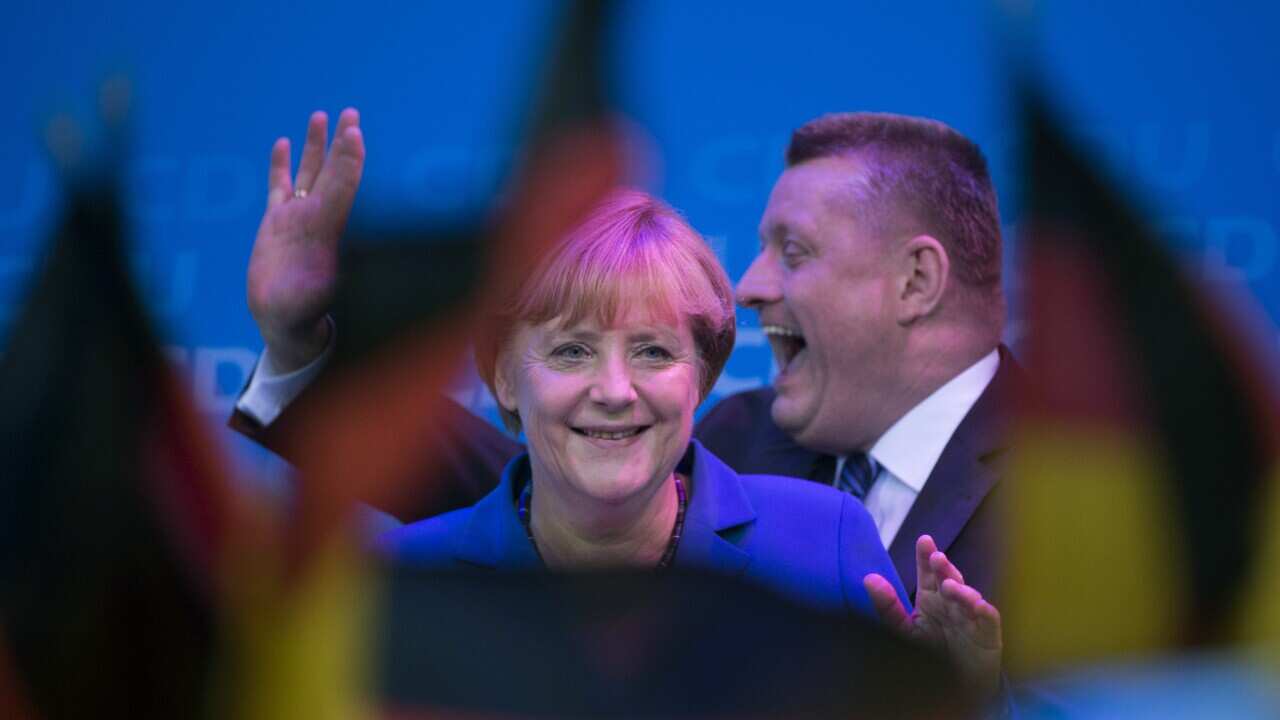(Transcript from World News Australia Radio)
Preliminary official results show Merkel's Christian Democratic Union (CDU) and its Bavarian sister party together won 41.5 per cent of the vote.
The main opposition centre-left Social Democrats (SPD) received 25.7 per cent and their preferred allies, the Greens, have 8.4 per cent.
Chancellor Merkel must now begin negotiations with potential governing partners.
Kerri Worthington reports.
German political analysts are calling it the era of the Merkel Republic, after what's been seen as an historic win for Angela Merkel.
She's the first woman to hold the position of German Chancellor, and her third election win puts her on course to become Europe's longest-serving female leader.
If she completes this four-year term, Angela Merkel will have passed former British prime minister Margaret Thatcher's 11 years in office.
Sunday's win followed a heavily personality-based campaign that focused on Ms Merkel's prudent leadership through the eurozone crisis -- and was greeted with joy by her supporters.
"Dear friends, your cheers show us that we can all celebrate. This is a super result. I'd like to thank the votes who have given us so clearly their trust and I can promise them, we will treat that trust responsibly."
The CDU's junior coalition allies, the pro-business Free Democrats (FDP), for the first time in over half a century missed out on any seats, garnering less than the five per cent of votes needed to stay in parliament.
The FDP's lead candidate, Rainer Bruderle, told supporters he's devastated by the loss.
"It's clear that this is the worst result the FDP has recorded so far. It's a difficult hour for the FDP and, as lead candidate, I take full responsibility."
The result means Ms Merkel's party will have to look for new partners to govern with.
That may mean teaming up with the main opposition centre-left Social Democrats, with whom Chancellor Merkel was in government after her first win in 2005.
The Social Democrats leader, Peer Steinbruck, has indicated he is open to negotiations, although he says he's disappointed not to have won a greater share of the vote.
"We did not get the result we wanted. We got a result which is clearly better than in 2009 but not a result which leads us to the goals we had in mind. Still, the situation is very unclear and that's why the SPD is well advised not to give into any speculation about what the formation of a government could look like. The ball is in Ms Merkel's court. She is the one who has to find a majority."
Of the other parties in the election, the far-left Linke scored 8.6 per cent, although it's not seen as a potential coalition partner with other leftist parties.
The eurosceptic Alternative for Germany (AfD) won 4.7 per cent of the vote, falling just short of the five-per cent hurdle to enter the Bundestag, or lower house of parliament.
The Internet freedom party, the Pirates, also disappointed its followers, with 2.2 per cent.
And the far-right National Democratic Party of Germany missed out on seats with 1.3 per cent of the vote.
All Europe has kept a close eye on Sunday's events, especially the cash-strapped states whose public finances are subjected to stringent austerity measures largely devised by Germany.
Vrasidas Karalis, Professor of Modern Greek at Sydney University, says Angela Merkel had put out mixed messages during the election campaign, suggesting that she may have considered the tougher pro-austerity stance of her coalition partners.
"By herself now, if we see the final result is probably an absolute majority in parliament, I mean she left some messages, gave some signs, that probably we can now relax these austerity measures and make more funds available to these countries in order to proceed with development and less with austerity measures, less with the restriction of funds going to the country."
Greece has had the most high-profile economic troubles in the last few years, and Germany has often criticised it over its spending.
But Professor Karalis says Angela Merkel has been a friend to Greece, and her re-election will be largely welcomed there.
"It seems that Angela Merkel has supported Greece and supported Greece in many crucial moments of the last three years. And I think that the fact that Greece is still in the eurozone is due because Germany, and specifically Angela Merkel, took the political responsibility for that. However, she's a politician, she must make concessions to her own electorate, she's accountable to her own parliament. And then, as you can understand, that makes this sort of double language that the politicians use sort of provocative for the Greeks themselves."

